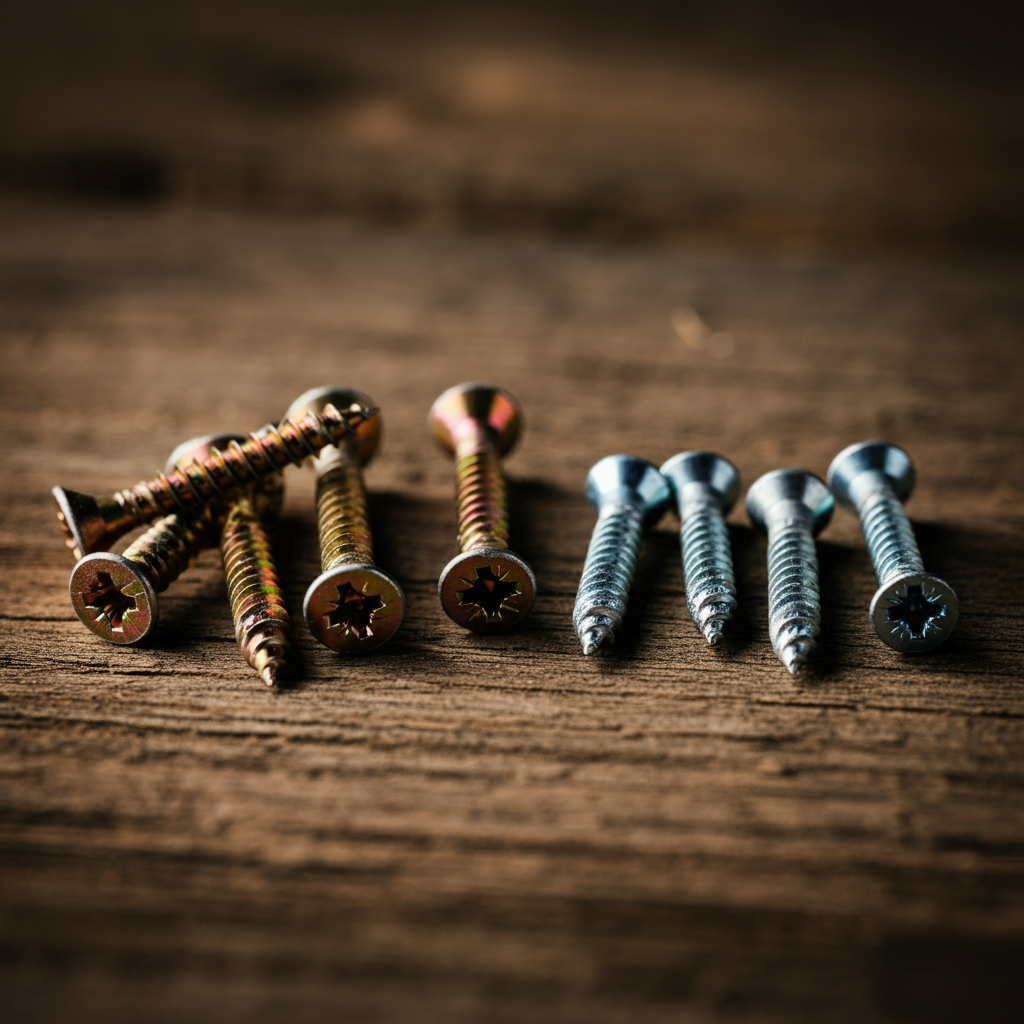N.Y. Renovation Services
Wood Screws vs. Deck Screws: Which is Right for Your NYC Project?
Planning a DIY project or a renovation in your Manhattan apartment, Brooklyn brownstone, or Long Island home? You’ll definitely need screws! But wait, did you know there’s a big difference between wood screws and deck screws? Choosing the right one is super important for making sure your project is strong, safe, and lasts a long time, especially with NYC’s unique building styles and weather. This guide will explain all about wood screws vs deck screws, what makes them different, and when you should use each type for your next project in Queens, Staten Island, or anywhere in the New York area. Understanding fasteners is key, and if your project gets big, RenovationServices.com can always help!
1. Wood Screws vs. Deck Screws: What’s the Big Difference Anyway?
When you walk down the fastener aisle at a hardware store, it can be a bit overwhelming! So many screws! Two types you’ll definitely see are “wood screws” and “deck screws.” They might look a little similar, but they are actually designed for very different jobs. Choosing correctly between wood screws vs deck screws is crucial for the success and safety of your project.
Think of it like shoes. You wouldn’t wear flip-flops to shovel snow in a Staten Island winter, right? And you probably wouldn’t wear heavy boots to a fancy party in Manhattan. Screws are kind of the same – you need the right type for the right situation!
So, what’s the main idea?
- Deck Screws: These guys are tough! They are specially made to be used **outdoors**. Think about building a deck in your Queens backyard, a fence for your Long Island home, or a planter box for your Brooklyn balcony. Because they live outside, deck screws are usually made of special materials (like stainless steel) or have special coatings that stop them from rusting or breaking down from rain, snow, and sun. This is super important for choosing screws NYC due to our varied weather.
- Wood Screws: These are your everyday heroes for **indoor** projects. They are designed to join pieces of wood together strongly for things you build inside your home, like furniture, cabinets, or shelves. They are usually made from steel and work great when they are kept dry.
Understanding this basic difference is the first step in picking the right fastener. Next, we’ll look closer at each type.
Quick Thought!
Have you ever used the wrong type of screw for a project by mistake? What happened? Sometimes learning from small oopsies helps us remember these important differences!
2. All About Wood Screws: Your Go-To for Indoor NYC Projects
Wood screws are probably what most people picture when they think of a basic screw. These are super useful for all sorts of projects you might do inside your NYC apartment or house. They are like the reliable workhorses of the fastener world for interior woodworking!
What Makes a Wood Screw a Wood Screw?
Traditional wood screws are designed specifically to join pieces of wood together very securely. Here are some things that make them special:
- Good for Joining Wood: Their main job is to pull two pieces of wood together tightly and hold them strong.
- Lots of Sizes: They come in many different lengths (how long they are) and diameters (how thick they are) so you can pick the perfect one for your job. For instance, tiny wood screws are great for small crafts, while big, long ones can hold together parts of a bookshelf.
- Different Head Styles: The “head” is the top part of the screw where your screwdriver goes. Wood screws can have different heads for different looks or reasons. We’ll talk more about these later!
- Pointy Tip: Most wood screws have a sharp point to help them start going into the wood.
- Threads for Gripping: The swirly lines on a screw are called threads. Wood screws have threads designed to grip well into wood fibers.
Common Uses for Wood Screws in Your NYC Home:
You’d use wood screws for all sorts of indoor tasks, whether you live in a Manhattan high-rise or a house in Staten Island. For example:
- Building furniture like tables, chairs, beds, or custom bookshelves.
- Assembling wooden frames for pictures or mirrors.
- Putting together kitchen or bathroom cabinets. (For professional kitchen remodeling, we always use top-quality fasteners!)
- Attaching hinges to doors or cabinet doors.
- Mounting small hardware, like shelf brackets (though for heavy shelves, especially into NYC plaster walls, you might need special anchors too!).
Understanding the Shank: A Key Feature
Many wood screws have a special feature called a “shank.” This is the smooth part of the screw right below the head, before the threads start. This unthreaded shank is clever! When you screw it into two pieces of wood, the threads only bite into the *bottom* piece of wood. As you tighten the screw, the smooth shank allows the head to pull the *top* piece of wood down really tight against the bottom piece. This creates a very strong, snug joint. This is a key difference when comparing wood screws vs deck screws for certain applications.
Diagram: Anatomy of a Typical Wood Screw
| Drive Type | Recess in Head (e.g., Phillips, Slotted, Square, Star/TORX) – Where the tool engages. |
| Head | Top part of the screw (e.g., Flat, Round, Oval, Pan, Trim) – Provides bearing surface. |
| Shank (Smooth) | Unthreaded upper part of the shaft – Allows the top piece of wood to be pulled tight against the bottom piece. Length varies. |
| Threads | Spiral ridges designed for gripping wood fibers (can be coarse for softwoods or fine for hardwoods). |
| Tip | Usually a sharp point for starting easily in wood, sometimes with self-drilling features on modern screws. |
This diagram highlights the key parts of a traditional wood screw, such as a Phillips flat head and a semi-threaded shank, perfect for creating strong joints in indoor woodworking projects in your NYC home.
While wood screws are amazing for indoor projects, remember they are usually made of plain steel, sometimes with a thin coating like zinc. This means they are not designed to get wet or be exposed to the harsh outdoor weather we can get in NYC. For that, you need a different kind of hero: the deck screw!
3. Deep Dive into Deck Screws: Built Tough for NYC Outdoors
Now, let’s talk about the tough guys of the screw world: deck screws! If your project is going to live outside in your Queens backyard, on your Brooklyn rooftop, or face the salty air near the coast in Long Island, then understanding wood screws vs deck screws is vital, and deck screws are almost always your best bet.
What Makes Deck Screws So Special for the Outdoors?
Deck screws are not just any old screw. They are engineered (that’s a fancy word for ‘specially designed and built’) to handle tough outdoor conditions. This is super important in NYC where we get hot summers, freezing winters, rain, snow, and sometimes even salty air if you’re near the water.
Here are the key features that make deck screws different and perfect for outside jobs:
- They Fight Rust and Rot (Corrosion Resistance!): This is their superpower! Deck screws are made from materials that don’t rust easily, like stainless steel. Or, they are made of strong steel that’s covered in special protective coatings. These coatings can be like a tough paint (polymer) or a special ceramic layer. This means they can get rained on and snowed on and still stay strong for many years. This is a huge factor when comparing wood screws vs deck screws for outdoor use.
- Strong Threads for a Mighty Grip: Deck screws often have very sharp, deep, and aggressive threads. These threads are designed to bite into wood (especially pressure-treated lumber, which is common for decks) very securely and help prevent the wood from splitting when you drive the screw in.
- Special Heads that Sink In Nicely: Most deck screws have heads that are designed to sink down slightly into the wood so they are flush (even) with the surface or just a tiny bit below. This is often called a “bugle” head (shaped a bit like the musical instrument) or a flat head with special “nibs” underneath that help it set smoothly. This is important so nobody trips over a screw head sticking up on your deck!
- Different Drive Types for Better Power: You’ll often find deck screws with square-shaped holes (Robertson drive) or star-shaped holes (TORX or star drive) in their heads. These are much better than the common Phillips head (cross shape) for outdoor work because your screwdriver or drill bit can get a much better grip. This means less chance of the bit slipping out and stripping the screw head, especially when you’re driving lots of long screws into tough wood.
When Do You Absolutely Need Deck Screws for Your NYC Project?
If it’s outside and made of wood, you probably need deck screws! For example:
- Building or repairing a deck (obviously!).
- Constructing a wooden fence around your yard.
- Building outdoor furniture like picnic tables, benches, or Adirondack chairs.
- Making wooden planter boxes for your balcony or patio.
- Building a pergola, trellis, or any other wooden structure that will be exposed to the weather.
Using the right deck screws means your outdoor creations will be safer, stronger, and last much, much longer against the NYC elements. If RenovationServices.com is building a deck or porch for you, you can be sure we’re using the best quality, corrosion-resistant fasteners for the job!
Think-Aloud Exercise: Your Outdoor Space
Look around your outdoor space in NYC – your balcony, patio, yard, or even rooftop. Are there any wooden structures? Do they look like they were built with the right kind of screws? Noticing these details can help you appreciate why choosing the correct fastener is so important for longevity!
5. The Big Question: When Should You Use Wood Screws vs. Deck Screws in NYC?
Okay, we’ve learned a lot about what makes wood screws and deck screws different. Now for the most important part: when should you actually use each one for your projects around your NYC home? Making the right choice between wood screws vs deck screws will help your work last longer and be safer.
Rule of Thumb: Inside or Outside?
The easiest way to remember is this:
- Wood Screws = Mostly for INDOOR projects where things will stay dry.
- Deck Screws = Mostly for OUTDOOR projects where things will get wet from rain, snow, or be exposed to lots of moisture and temperature changes.
Let’s break that down a bit more with some common NYC scenarios.
When to Reach for Deck Screws (Your Outdoor Champions):
You should absolutely choose deck screws if your project involves:
- Building or Repairing a Deck: This is what they are named for! Whether it’s a big backyard deck in Staten Island, a small patio deck for your Queens townhouse, or even a rooftop deck common in some Brooklyn buildings (with proper permissions, of course!). The wood will get wet, so you need that rust protection. The strength of deck screws is also critical here.
- Constructing Outdoor Furniture: Making a wooden bench for your stoop, a picnic table for your yard, or planters for your balcony? Use deck screws. They’ll handle the rain and changing NYC seasons.
- Installing a Wooden Fence: Whether it’s for privacy or decoration, fence posts and panels need screws that won’t rust away. This is a clear case for deck screws. (Need fence services? We can help!)
- Building a Pergola, Arbor, or Gazebo: Any wooden structure in your yard or on a patio needs the weather resistance of deck screws.
- Working with Pressure-Treated Lumber: This type of wood is often used for outdoor projects because it resists rot and insects. However, the chemicals in pressure-treated wood can be very corrosive to regular screws. Therefore, you MUST use screws specifically labeled for use with pressure-treated lumber – and these are almost always specialized deck screws (often stainless steel or with very robust coatings). Using the wrong screws here can cause them to fail surprisingly fast.
NYC Scenario: Building a Balcony Planter Box
You live in a Manhattan apartment with a small balcony and want to build some wooden planter boxes for herbs and flowers. Even though it’s somewhat sheltered, it will still get rain and be exposed to temperature swings. Definitely use deck screws (preferably stainless steel or a good polymer-coated type) for assembling those boxes to ensure they last for many seasons! Choosing the right screws for NYC outdoor mini-projects matters too.
When Wood Screws Are Your Best Bet (Your Indoor Allies):
Wood screws are perfect when your project will live comfortably inside, away from the rain and harsh weather. Common uses include:
- Building Indoor Furniture: Making shelves for your living room, a new bookcase, a small coffee table, or assembling flat-pack furniture that comes with its own (often less robust) fasteners that you might want to upgrade.
- Cabinetry Work: Joining cabinet frames, attaching cabinet doors with hinges, or installing drawer slides.
- Interior Trim Work: Attaching wooden baseboards, window casings, or crown molding (though sometimes finishing nails are also used here for a less visible look).
- General Woodworking and Crafts: Any indoor project where you’re joining pieces of wood together.
- Hanging Light-to-Medium Weight Items (with caution): You can use wood screws to hang some lighter pictures or small shelves directly into wooden studs in your walls. However, for heavy items or if you’re screwing into just drywall in your NYC apartment (which is common), you’ll need to use appropriate drywall anchors along *with* the screws. Learn how to hang things on drywall here.
For these indoor jobs, the extra cost and specific features of deck screws (like heavy-duty corrosion resistance) usually aren’t needed. Good quality wood screws will give you a strong, lasting hold.
What’s Your Next Project?
Think about the next woodworking or repair project on your list for your NYC home. Will it be indoors or outdoors? What kind of wood will you be using? Answering these simple questions will immediately tell you whether you should be looking at wood screws or deck screws!
Understanding the core difference – indoor vs. outdoor – is the main decider when comparing wood screws vs deck screws. However, as we’ll see, there are even more details in their design that make them suited for their specific jobs.
13. Your Screw Questions Answered!
Choosing between wood screws vs deck screws can bring up a few questions, especially for specific NYC projects. Here are some common ones we hear at RenovationServices.com:
Q1: Can I ever use wood screws for a quick outdoor fix in NYC if it’s a sheltered spot?
A: It’s really not recommended, even for a sheltered spot. NYC weather can be unpredictable, with humidity, rain that blows sideways, and big temperature swings. A standard wood screw (especially if it’s just plain steel or zinc-plated) will likely start to rust and weaken much faster than you think, even if it’s not directly in the rain. This can lead to stains on your wood and, more importantly, a failed connection. For any outdoor use, it’s always best to use proper deck screws for peace of mind and longevity.
Q2: Are stainless steel deck screws always better than coated deck screws?
A: Stainless steel deck screws (especially grades like 305 or 316) offer excellent corrosion resistance, particularly in coastal areas like parts of Long Island or areas near the water in Brooklyn or Staten Island where there might be salt in the air. However, they can also be more expensive and sometimes a bit softer (more prone to the head stripping if you’re not careful) than high-quality coated carbon steel deck screws. Modern polymer or ceramic coated deck screws offer very good corrosion protection for most general outdoor NYC applications and can be very strong. The “best” choice often depends on your specific environment and budget.
Q3: Do I always need to pre-drill pilot holes when using deck screws in pressure-treated wood?
A: Many modern deck screws are “self-drilling” or have special tips and thread designs that help reduce wood splitting, especially in softer pressure-treated pine. However, it’s still a very good practice to pre-drill pilot holes, especially if:
- You are working very close to the end of a board (to prevent splitting).
- You are using very dense hardwoods for your deck (like Ipe, though less common for DIY).
- You want to ensure the screw goes in perfectly straight.
A pilot hole that’s slightly smaller than the screw’s shank diameter can make driving the screw easier and prevent splitting, ensuring a stronger connection. This is good practice for any significant wood screws vs deck screws decision involving structural integrity.
Q4: What does “ACQ compatible” mean when I see it on a box of deck screws?
A: ACQ (Alkaline Copper Quaternary) is a common type of chemical used in modern pressure-treated lumber to protect it from rot and insects. However, these ACQ chemicals can be much more corrosive to metal fasteners than older types of pressure treatment (like CCA, which is no longer used for most residential applications due to arsenic concerns – see EPA.gov for info on CCA). So, if you are using ACQ-treated lumber for your NYC deck or outdoor project, you MUST use screws that are specifically labeled “ACQ compatible.” These will be made of stainless steel or have specialized coatings designed to resist corrosion from ACQ chemicals.
Q5: If my NYC renovation project involves both indoor and outdoor wooden parts, can RenovationServices.com help choose and use the right screws?
A: Absolutely! When you work with RenovationServices.com for any project in Manhattan, Queens, or any other borough, our experienced carpenters and builders always select the appropriate fasteners – whether wood screws, deck screws, or other specialized connectors – for each specific application. We understand the materials, the environmental exposure, and the structural needs to ensure every connection is strong, durable, and code-compliant. That’s part of our commitment to quality craftsmanship!
Ready to Build Something Great (and Use the Right Screws)?
Understanding the difference between wood screws vs deck screws is a small detail that makes a big difference in the quality and lifespan of your NYC projects. Whether you’re building a bookshelf for your apartment or a new deck for your backyard, choosing the right fastener is key!
If you’re planning a renovation or construction project in Manhattan, Brooklyn, Queens, Staten Island, or Long Island and want to ensure every detail, right down to the screws, is handled professionally, the team at RenovationServices.com is here to help. We bring expertise and quality to every job.
Let’s build it right, from the foundation to the fasteners!
Call Us: (347) 455-1741
Email for Your Project Consultation






